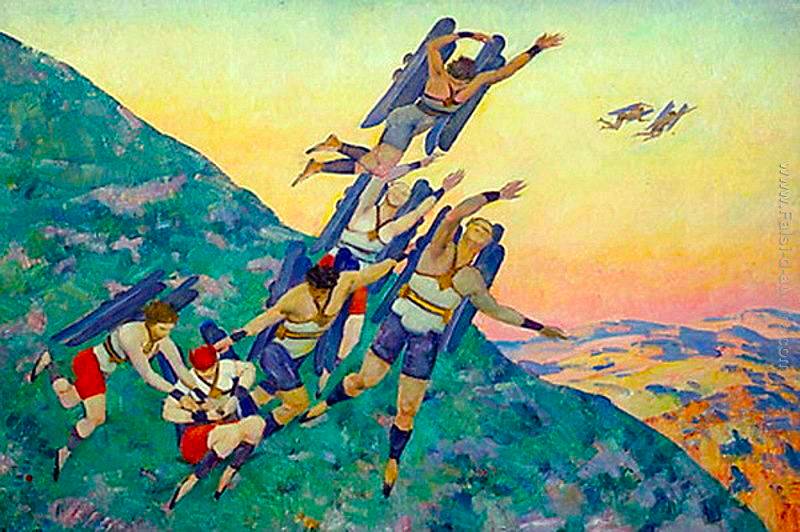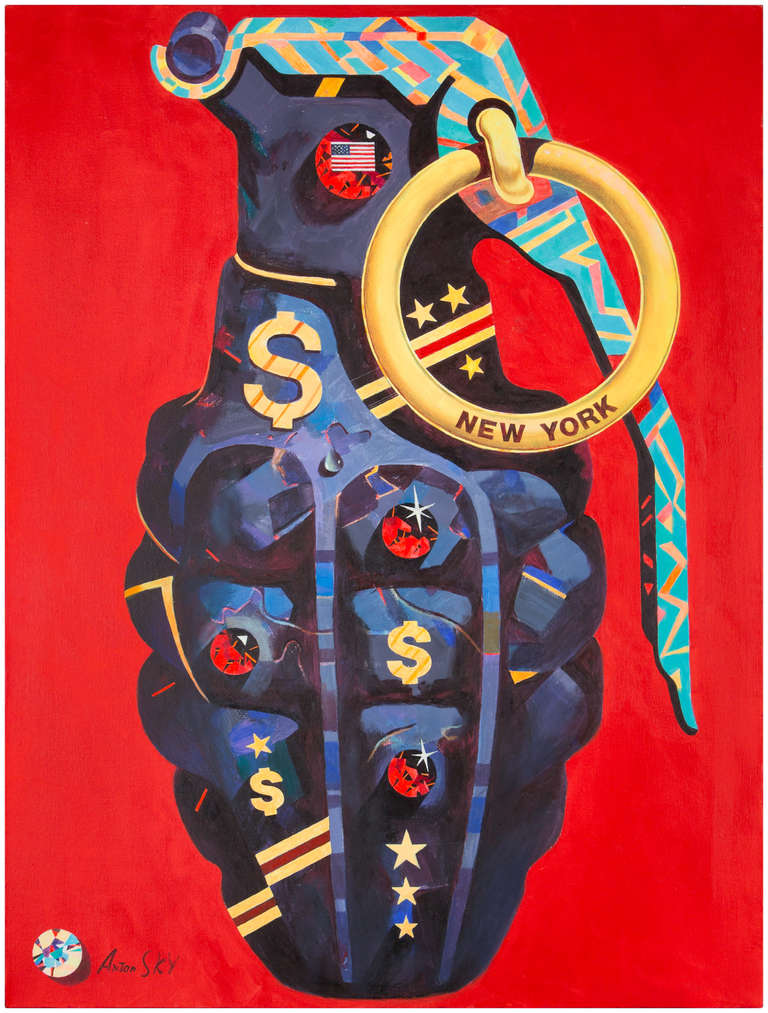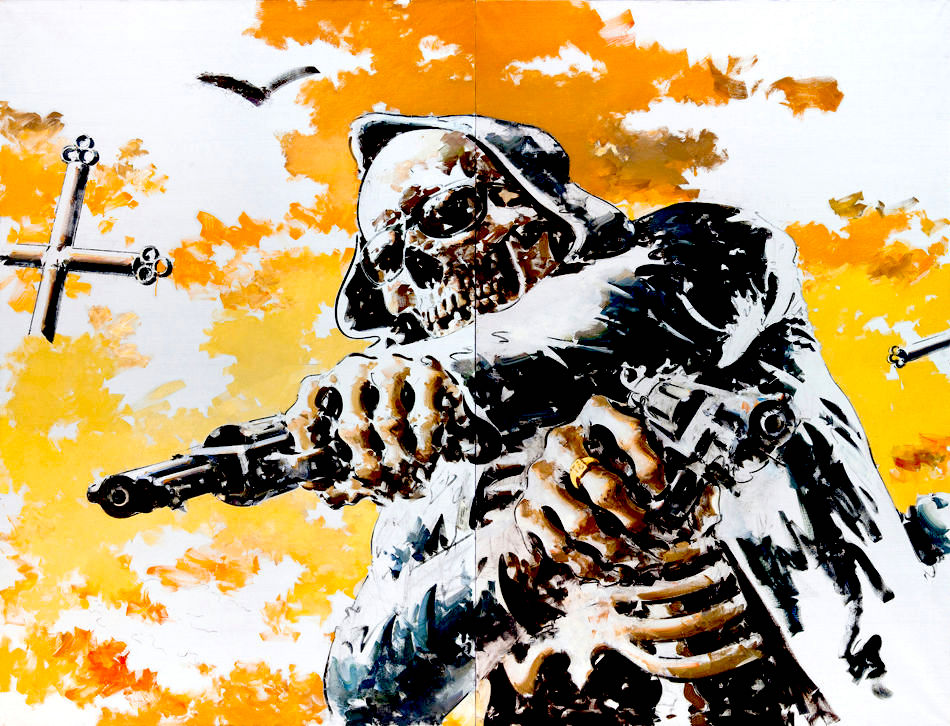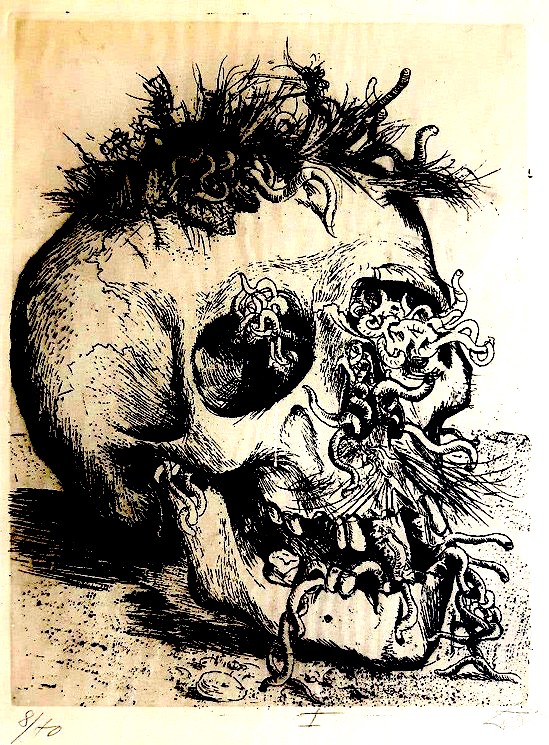Rather than allow this war to escalate and for positions to harden, it is important for the guns to go silent and the discussions to recommence. writes Vijay Prashad.

Konstantin Yuon, U.S.S.R., “People of the Future, ” 1929.
By Vijay Prashad
Tricontinental: Institute for Social Research
 It is impossible not to be moved by the outrageousness of warfare, the ugliness of aerial bombardment, the gruesome fears of civilians who are trapped between choices that are not their own. If you read this line and assume I am talking about Ukraine, then you are right, but of course, this is not just about Ukraine. In the same week that Russian forces entered Ukraine, the United States launched airstrikes in Somalia, Saudi Arabia bombed Yemen and Israel struck Syria and Palestinians in Gaza.
It is impossible not to be moved by the outrageousness of warfare, the ugliness of aerial bombardment, the gruesome fears of civilians who are trapped between choices that are not their own. If you read this line and assume I am talking about Ukraine, then you are right, but of course, this is not just about Ukraine. In the same week that Russian forces entered Ukraine, the United States launched airstrikes in Somalia, Saudi Arabia bombed Yemen and Israel struck Syria and Palestinians in Gaza.
War is an open sore on humanity’s soul. It draws precious social wealth into destruction: “The impact of war is self-evident,” wrote Karl Marx in the Grundrisse (1857–58), “since, economically, it is exactly the same as if the nation were to drop a part of its capital into the ocean.” It disrupts social unity and damages the possibility of international solidarity: “workers of the world unite in peacetime,” wrote Rosa Luxemburg in Either Or (1916), “but in war slit one another’s throats.”
War is never good for the poor. War is never good for workers. War itself is a crime. War produces crimes. Peace is a priority.

Anton Kandinsky, Ukraine, Grenade, 2012.
The war in Ukraine did not begin with the Russian intervention. There are a series of authors for this war, each one important to understanding what is happening today.
Pluri-Nationalism vs. Ethnic Chauvinism
Ukraine, shaped out of Lithuanian, Polish and Tsarist empires, is a pluri-national state with large minorities of Russian, Hungarian, Moldavian and Romanian speakers. When Ukraine was part of the Soviet Union, the question of ethnicity was held in check by the fact that all Ukrainians were Soviet citizens and that Soviet citizenship was supra-ethnic. In 1990, when Ukraine departed from the Soviet Union, the question of ethnicity emerged as a barrier to full participation in society for all Ukrainians. The socio-political problem faced by Ukraine was not unique; ethnic nationalism surfaced in almost every country in the post-communist East, from the terrible break-up of Yugoslavia initiated by Croatian independence in 1991 to the military confrontation between Georgia and Russia in 2008. Ethnic cleansing was treated as utterly normal, such as when the West cheered on the forced removal of half a million Serbs from Krajina, Croatia in 1995. In contrast, Czechoslovakia, one of the countries in the communist East, broke up along ethnic lines peacefully in 1993 into the Czech Republic and Slovakia.
Regional Peace vs. NATO’s Imperialism, Part I
After the collapse of the Soviet Union and the dissolution of the Warsaw Pact (1991), the United States sought to absorb all of eastern Europe into the North Atlantic Treaty Organisation (NATO). This was despite the agreement made in 1990 with the last government of the Soviet Union that, in the words of then U.S. Secretary of State James Baker, NATO would not move “one-inch eastwards.”
In the new period, eastern European countries and Russia sought integration into the European project through entry into the European Union (for political and economic purposes) and into NATO (for military reasons). During the presidency of Boris Yeltsin (1991–1999), Russia became a NATO partner and joined the G-7 (which, for a time, became the G-8). Even in President Vladimir Putin’s early years, Russia continued to think that it would be welcomed into the European project.
In 2004, NATO absorbed seven eastern European countries (Bulgaria, Estonia, Latvia, Lithuania, Romania, Slovakia, and Slovenia); at that time, NATO’s secretary general, Jaap de Hoop Scheffer, said that Russia understood that NATO had “no ulterior motives.” However, Moscow eventually called NATO’s persistent march eastward into question, and, in 2007, Putin accused NATO of “muscle-flexing” in eastern Europe. From then on, NATO’s expansion became an increasingly contentious matter.
Although Ukraine’s entry into NATO was blocked by France and Germany in 2008, the question of Ukraine being drawn into the NATO project began to define Russian-Ukrainian politics. This last point highlights how the discussion about “security guarantees” for Russia is incomplete; it is not about Russia’s security fears alone – since Russia is a major nuclear power – it is also about Europe’s relationship with Russia. Namely, would Europe be able to form a relationship with Russia that is not predicated upon U.S. diktats to subordinate Russia?
Democracy vs the Coup
In 2014, Ukrainian President Viktor Yanukovych sought a loan from Russia, which Putin said he would provide if Yanukovych would sideline the country’s oligarchy-controlled financial networks. Instead, Yanukovych turned to the European Union (EU), which offered similar advice, but whose concerns were set aside by the United States, a dynamic that was on full display when U.S. Assistant Secretary of State Victoria Nuland told U.S. Ambassador to Ukraine Geoffrey Pyatt, “Fuck the EU.”
Earlier, Nuland had boasted about the billions of dollars the U.S. spent on “democracy promotion” in Ukraine, which in fact meant the strengthening of pro-Western and anti-Russian forces. Yanukovych was removed and replaced in a parliamentary coup by a string of U.S.-backed leaders (Arseniy Yatsenyuk and Petro Poroshenko).
President Poroshenko (2014–2019) drove a Ukrainian nationalist agenda around the slogan armiia, mova, vira (“military, language, faith”), which became reality with the end to military cooperation with Russia (2014), the enacting of legislation which made Ukrainian “the only official state language” and restricted the use of Russian and other minority languages (2019), and the Ukrainian church breaking ties with the Patriarch Kirill of Moscow (2018). These measures, along with the empowerment of neo-Nazi elements, shattered the country’s pluri-national compact and produced serious armed conflict in the Donbass region of eastern Ukraine, which is home to a substantial Russian-speaking ethnic minority. Threatened by state policy and neo-Nazi militias, this minority population sought protection from Russia. To mitigate the dangerous ethnic cleansing and end the war in the Donbass region, all parties agreed to a set of de-escalation measures, including ceasefire, known as the Minsk Agreements (2014–15).

Vasiliy Tsagolov, Ukraine, “Untitled,” 2008.
Regional Peace vs. NATO Imperialism, Part II.
Emboldened by the West, the Ukrainian ultra-nationalists grew their power, and the possibility of negotiations to settle the conflict waned. Violations of the Minsk Agreements by all sides undermined the process. For eight years, the people of the Donbass lived in a constant state of war, which, according to the United Nations, produced over 14,000 deaths and over 50,000 casualties between 2014 and 2021.
There appeared to be no exit from that situation. What began to take place was essentially ethnic cleansing, with large sections of Russian speakers fleeing across the border to the Rostov region of Russia and Ukrainian speakers moving westwards. There was little international attention paid to this crisis and the rise of the neo-Nazi elements.
NATO powers refused to take these issues seriously or provide Moscow with security guarantees; particularly, to guarantee that Ukraine would not be provided with nuclear weapons and would not become a member of NATO. Furthermore, Russia intervened to seize Crimea, where its navy has a warm water port. These moves further destabilized the situation, threatening the security of the region. NATO’s refusal to negotiate over Russia’s security is the spur that led to the intervention.

Otto Dix, Germany, “Schaadel” or “Skull,” 1924.
Wars make very complicated historical processes appear simple. The war in Ukraine is not merely about NATO or about ethnicity; it is about all these things and more. Every war must end at some point and diplomacy must restart. Rather than allow this war to escalate and for positions to harden too quickly, it is important for the guns to go silent and the discussions to recommence. Unless at least the following three issues are put on the table, nothing will advance:
- Adherence to the Minsk Agreements.
- Security guarantees for Russia and Ukraine, which would require Europe to develop an independent relationship with Russia that is not shaped by U.S. interests.
- Reversal of Ukraine’s ultra-nationalist laws and a return to the pluri-national compact.
If substantive negotiations and agreements regarding these essential matters do not materialize over the next few weeks, it is likely that dangerous weapons will face each other across tenuous divides and additional countries will get drawn into a conflict with the potential to spiral out of control.
The Soviet Ukrainian writer Mykola Bazhan wrote the powerful poem Elegy for Circus Attractions (1927) on the tensions of a circus. Could there be any better metaphor for our times?
A lady will shriek out piercingly…
Then panic takes aim and flies
into their heart-breaking howls,
crumpling their naked mouths!
Grind up the spit and tears,
whisk lips into grimaces!
They’re swinging like corpses on threads,
the voices.
Vijay Prashad, an Indian historian, journalist and commentator, is the executive director of Tricontinental: Institute for Social Research and the chief editor of Left Word Books.
This article is from Tricontinental: Institute for Social Research.
The views expressed are solely those of the author and may or may not reflect those of Consortium News.

From what I’ve read, the Rand Corporation played a role in the effort to destabilize Russia. In other words, the US sought conflict with Russia via a proxy war in Ukraine. Therefore, it has no incentive to cease hostilities since continuing to keep Russia bogged down in Ukraine to weaken its leadership is the desired outcome. The US has no concern for the people who will suffer from a drawn out conflict. If we have learned anything from US foreign policy at this point, it should be that.
“It is impossible not to be moved by the outrageousness of warfare … ”
We have been wracked by (primarily US) wars to the degree that we are now numb to them. Pick a continent. Pick a country. With very, very few exceptions, you will find the US agitating, interfering, and dropping freedom bombs all over the place.
I’d be far more gobsmacked if we went a year without the US spreading ‘freedom and democracy’ (at gunpoint).
“After the collapse of the Soviet Union and the dissolution of the Warsaw Pact (1991), the United States sought to absorb all of eastern Europe into the North Atlantic Treaty Organisation (NATO). This was despite the agreement made in 1990 with the last government of the Soviet Union that, in the words of then U.S. Secretary of State James Baker, NATO would not move “one-inch eastwards.”
Technically it wasn’t an agreement, it was a promise or assurance given to Gorbachev by top diplomats from a number of Nato countries including the US and Germany. In international law, it has no value, just like the Budapest Memorandum guaranteeing Ukraine’s sovereignty is a “memorandum” and not a legally binding international treaty.
That exactly is the crux of the matter. Today, Western diplomats say that the assurances given to Gorbachev have no value and that, anyways, these assurances have become null and void by subsequent events.
Now, listen to this: today, in the year of 2022, the West again asks Russia to believe its assurances that Ukraine will not become Nato member – for the time being, while at the same time refusing to make any legally binding commitments. Do they think the Russians have such a short memory?
The Western free media is unwilling to let any word of the pre-February 24, 2022 “invasion by the evil Putin” be seen or heard. Only a special information diet of wonderful, democratic, white Ukrainian perfect citizens, led by a brave young heroic actor against the completely unjustified and of course wholly unprovoked attack to murder millions of innocent Ukie peacemakers in their homes, is permitted on pain of sanctions from hell.
Here’s what I wrote on the subject
It has become unbearable to observe the western media, in the grip of corrupt military contractors, wielding their undue influence on the unknowing victims of the media “news” reports as they publicly and shamelessly celebrate their enormous profits this year from the billions of dollars in weapons they are selling to keep the Ukraine war going. The drumbeat of demonization and excoriation of Putin by the western media, as the sole provocative cause of all the current havoc and evil, with hardly a word devoted to the historical context that brought us to this tragic turn of events is unconscionable. There is barely any reporting in the western press of the events leading up to this violence, resulting from the corrupt path the western neoliberal corporate corrupters followed, ever since the blessed ending of the Cold War when Gorbachev ended the Soviet occupation, dissolving the Warsaw Pact, without a shot. The US promised him, in a host of documents and testimonies that are surfacing recently, including from Reagan’s Ambassador Jack Matlock, that if Russia didn’t object to a unified Germany joining NATO, it would not expand one inch to the East. Since Russia lost 27 million people to the Nazi onslaught, they had good reason to be fearful of an expanded western military alliance.
Yet the arrogance of the United States has been breathtaking over these years. Not only did the US expand NATO taking in 14 countries from Poland to Montenegro, it bombed Kosovo over Russia’s Security Council objection, breaking its treaty obligation with the UN never to commit a war of aggression without Security Council approval unless under imminent threat of attack, which was certainly not the case with Kosovo. Further, it walked out of the 1972 Anti-Ballistic Missile Treaty, left the Intermediate Nuclear Forces Treaty as well as the carefully negotiated deal with Iran to preclude their enriching uranium to bomb grade. Shockingly, the US keeps nuclear weapons in five NATO states: Germany, Belgium, the Netherlands, Italy, and Turkey. The current media drumbeat for war, the glee expressed by reporters and commentators at the prospect of all the devastating economic sanctions we are inflicting on the Russian people, in retribution for what they describe as Putin’s provocative invasion of Ukraine, and the constant drumbeat of how evil and crazy Putin is, may indeed be putting us on the path to World War and nuclear war at that.
It’s as though we are all living in some nightmare scenario, like the movie Don’t Look Up, with greed-driven military contractors controlling our lamestream media and fanning the flames of war! Look up people! How would we feel if Russia took Canada or Mexico into their military alliance? The US went berserk when the USSR put weapons in Cuba! So why don’t we urge Ukraine to back off and stop sending them even one more bullet to fuel a senseless war? Let Ukraine agree to be neutral like Finland and Austria instead of insisting they have a right to be part of our military alliance which Putin has been pleading with us for years to stop expanding. It was perfectly reasonable for Putin to require that Ukraine not become a member of NATO and we should take him up on it and save the world from the scourge of war with new programs of cooperation to end the plague, abolish nuclear weapons, and save our Mother Earth from looming catastrophic climate destruction. Let us usher in a new era of cooperation to deal with the real threats
I’m not sure that this analysis adds to what is already known.
Peace is desirable, but wars normally end when one side loses the capacity to fight.
Perhaps what is known by you. Not every reader knows the story. We have many new readers to our site and this may be the first or only article that they read.
Thanks for this. It will go in my ‘Reading material for propagandised dummies’ folder for further use.
Thank you Consortium News for your reply to Larry. I learned a long time ago from a wise teacher who taught us, “never to assume anything,” as what you think others know, they may not know.
I could read and listen to Vijay Prashad all day, as I’ve read his articles and have listened to his knowledgeable, scholarly presentations on subjects he knows well, on kpfa.org, America’s first public supported radio station, over the years.
His article above certainly is a history lesson for open-minded people who are eager to learn how this U.S. orchestrated “crisis” in Ukraine began.
Except Vijay reversed the time line of the events involving the so called revolution of 2013 2014. Yanucovich first approached the EU for money and he did get a proposal but it did have all sorts of conditions and then went to Russia for help. We all know what happened next.
Joe Biden was untruthful about all this in his State of the Union speech.
Not only there, of course … And every time Anthony Blinken speaks words of condemnation of any other country, it is always something we have done and continue to do in spades–dwarfing their infractions.